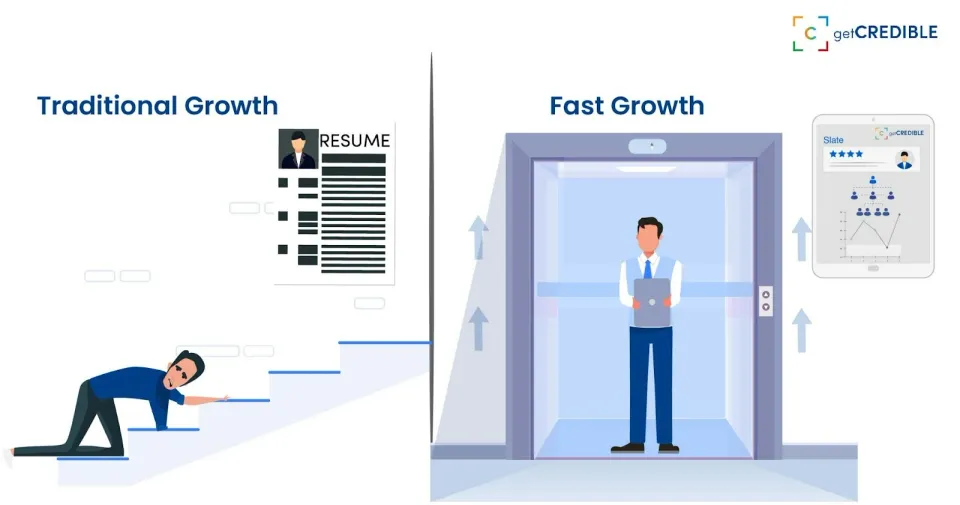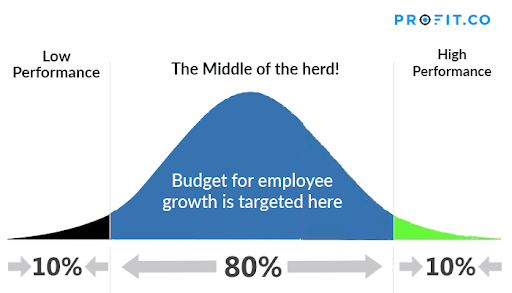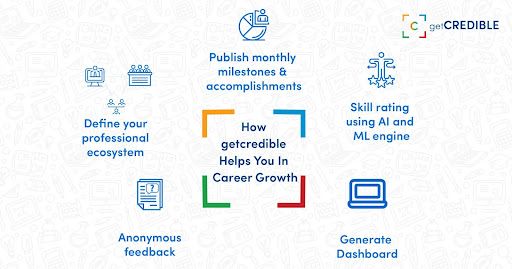Accelerating Career Growth within your Organization - How to Do It?

Professionals seek ways to grow faster for better roles and compensations. At the same time, organizations perform employee appraisals to evaluate their employees' performance, career growth, and development.
Most of these performance appraisals are done annually, and the reporting manager's decision often has the highest weightage, usually more than 90%.
For an employee, it is always better if the frequency of appraisal is shorter than annual ones, that is, monthly or quarterly. Also, peers, customers, partners, dotted line managers, and others referred to as your professional ecosystem do not have a say in employee’s appraisal.
Most organizations follow the below structure for appraisals.

As you can see, about 80% of them fall in the middle category, with only 10% falling into the high-performance category. Employees falling into this high-performance section get the highest raises and promotions.
Given this background, how do you prepare yourself to fall into the high-performance category?
While it may not be possible for you to change your organization’s appraisal and feedback system for all employees, you can drive your career growth by understanding and adapting to them. The key to preparing yourself to be a high performer is continuously getting feedback and improving your performances and skill sets.
Types of Career Growth
There are two types of career growth: Status Quo or Passive and Active career growth. In the passive career growth option, employees follow orders or instructions from management. In active career growth, employees proactively think and perform activities toward organizational growth without waiting for instructions.
Status Quo or Passive
Status quo means that you are content with how things are and do not think about your career progression in the immediate future. They may or may not be forward-thinking, but they are happy with where they are and do not want to climb out of their comfort zone. These individuals become loyal to the company and they use their creativity and skills to retain their position rather than aiming for better career stands or pay scales.
Active Career Growth
Individuals who are proactive about their career growth are always looking for ways to improve their skills and knowledge, and take on new challenges. Reasons for demanding such an advancement may be a better status, job satisfaction, pay, or position. They are forward-thinking and focused on achieving long-term goals to utilize their creativity and improve their professional skills.
Factors impacting Career Growth
While we acknowledge that several other factors are essential in deciding your growth, the weightage of factors that impact your growth is often underrated, resulting in less optimal outcomes in your appraisal process.
The following are these additional factors that can impact your growth:
1. Your relationship with your manager
- Trust and the relationship you have with your hiring manager is an important one. It becomes even more critical if your manager is people-centric and emotional, not data-centric and detail-oriented.
2. Emotions & Egos
- Emotions and egos can play a significant role, not just between the manager and employee but also between the manager and others with whom they interact before the appraisal meeting.
3. Impact of events very close to appraisal meeting
- Some events related to the organization involving your manager’s responsibility, like external audits or quality issues that your manager is responsible for, can impact your appraisal, even though it is outside your control.
3. Visibility into your skills and business impact
- Most employees believe their skills and contribution to the organization are well understood and visible. However, the actual visibility would be low and even lower in cases where a manager has more than 8 reporting employees.
4. Customer’s (internal and external) perception and opinion on your performance
- The value of a service provided by an employee to a customer (internal or external) is the most valuable to an organization. Most managers do not contact customers for regular feedback but instead react only to issues. In this case, much positive feedback would be lost, which is critical to positive appraisal.
These factors would influence a better career growth and prevent the negative impacts to an extent. You need to build a network that will drive your professional growth.
Challenges with Current System
Most organizations have HR or Employee management systems designed to capture annual appraisal data. Even some new Software as a Service HR products do a great job of employee benefits management. However, when it comes to managing employee performance, there has not been much of a change. The current process followed by most organizations are:
- Goal setting and acceptance at the beginning of the year
- Employee self-appraisal at end of the year
- Manager’s performance review and feedback
These steps are very time-consuming and structured, giving very little room for employees to document and report their contributions to changing business conditions that happen all the time. In your manager’s defense, it is impossible to visualize the changes a business encounters during the year.
Due to the above constraints, it is almost impossible to have a monthly performance discussion with your manager that includes non-planned changes and have it documented for end-of-the-year review across the organization.
While changing the organization system is beyond your control, you can follow these techniques to improve your chances for career growth.
How can you equip yourself?
getCREDIBLE is a platform designed to establish a professional’s credibility. Hence, it helps you engage different stakeholders from your professional ecosystem to publish your achievements (milestones) and get feedback. This feedback flows continuously with a frequency that is suitable for your profession. For most professions, monthly frequency is most suited.
getCREDIBLE platform allows you to perform the following:

When it comes to career growth, you need an effective system to review your workplace performance, productivity, and skills and rate them accordingly to show whether you are improving your performance or not. The ratings and dashboards are generated automatically without human involvement, making them very objective and unbiased, representing your true contribution to your organization and making it irrefutable in your appraisal conversations.
This information can also be used to generate a digital version of your resume called SLATE, which is easy to view and share with your manager or anyone else involved in your appraisal process. Read more on how to make a resume that stands apart from the competition.
Conclusion - What’s your investment to grow faster?
Now you understand the features of the getCREDIBLE platform and know the activities you need to do to accelerate your career growth within an organization.
Are you probably wondering how much time and money you must spend to give yourself good career growth? Look into the insights below for a better spin-off.
- Time – 15 minutes per week or 1 hour per month
- Cost – Free getCREDBIBLE platform is free to use for all the features described above. They have a premium subscription with additional features to design your own SLATE, but that is optional.
Also, along with these you must learn what professional credibility is and how to get ratings for professional credibility.
Check out getCREDIBLE! We would appreciate your valuable feedback on how the platform works and benefits you.
We are on this journey together to help you grow professionally. All the best!
